





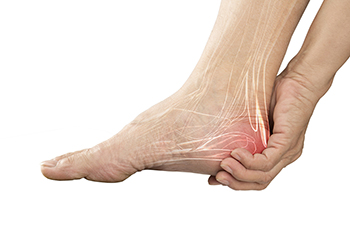
Plantar fasciitis is the most common cause of heel pain. This condition is the inflammation of the tough band of tissue, called the plantar fascia, that runs along the sole of the foot from toes to heel. This tissue helps support the arch and plays an important role in foot mechanics when walking. Causes of plantar fasciitis include standing or walking for long periods, heel spurs, pregnancy, and obesity. Wearing shoes with little or no cushioning in the heel and sole, as well as walking barefoot, may also contribute to the inflammation. The pain of plantar fasciitis is usually a stabbing sensation, felt most in the heel. It tends to be worse upon awakening or after prolonged activity. When pressure is placed on the arch of the foot, pain increases. A feeling of tightness in the calf muscles is another indicator of plantar fasciitis. Luckily, there are a number of remedies for plantar fasciitis. For more information, please make an appointment with a podiatrist.
Plantar fasciitis can be very painful and inconvenient. If you are experiencing heel pain or symptoms of plantar fasciitis, contact one of our podiatrists from Active Foot and Ankle Care, LLC. Our doctors can provide the care you need to keep you pain-free and on your feet.
What Is Plantar Fasciitis?
Plantar fasciitis is the inflammation of the thick band of tissue that runs along the bottom of your foot, known as the plantar fascia, and causes mild to severe heel pain.
What Causes Plantar Fasciitis?
How Can It Be Treated?
While very treatable, plantar fasciitis is definitely not something that should be ignored. Especially in severe cases, speaking to your doctor right away is highly recommended to avoid complications and severe heel pain. Your podiatrist can work with you to provide the appropriate treatment options tailored to your condition.
If you have any questions please feel free to contact our offices located in Fair Lawn, Riverdale, and Englewood, NJ . We offer the newest diagnostic and treatment technologies for all your foot and ankle needs.
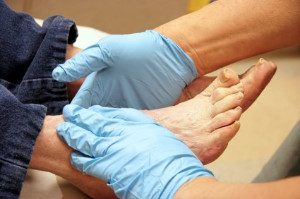
One of the chief symptoms of diabetes is chronic foot pain, which is common to most people with this disease. Three major causes of diabetic foot pain are nerve problems, circulatory problems, and infections. A condition known as peripheral neuropathy is the result of damage to the nerves that supply blood to the lower legs, feet, and toes. Specific to diabetics is sensory neuropathy, which results in extra sensitivity to pain in these areas. The diabetic may also experience a loss of sensation in this part of the body that contributes to the cracking and drying of the skin. Another cause of chronic foot pain is peripheral artery disease (PAD). This is the result of sustaining high levels of blood sugar that can clog the arteries and capillaries and slow the flow of blood to the feet and toes. The third most common cause of diabetic foot pain is infections. The diabetic is highly susceptible to infection from sores, cracks, and cuts. Because it is difficult to feel them when they occur, they often go unnoticed. Further, PAD makes it more difficult for these injuries to heal, causing ulcers and other more serious problems. If you are a diabetic and have chronic foot pain, please make an appointment with a podiatrist for an exam and diagnosis.
Diabetic foot care is important in preventing foot ailments such as ulcers. If you are suffering from diabetes or have any other concerns about your feet, contact one of our podiatrists from Active Foot and Ankle Care, LLC. Our doctors can provide the care you need to keep you pain-free and on your feet.
Diabetic Foot Care
Diabetes affects millions of people every year. The condition can damage blood vessels in many parts of the body, especially the feet. Because of this, taking care of your feet is essential if you have diabetes, and having a podiatrist help monitor your foot health is highly recommended.
The Importance of Caring for Your Feet
Patients with diabetes should have their doctor monitor their blood levels, as blood sugar levels play such a huge role in diabetic care. Monitoring these levels on a regular basis is highly advised.
It is always best to inform your healthcare professional of any concerns you may have regarding your feet, especially for diabetic patients. Early treatment and routine foot examinations are keys to maintaining proper health, especially because severe complications can arise if proper treatment is not applied.
If you have any questions please feel free to contact our offices located in Fair Lawn, Riverdale, and Englewood, NJ . We offer the newest diagnostic and treatment technologies for all your foot and ankle needs.
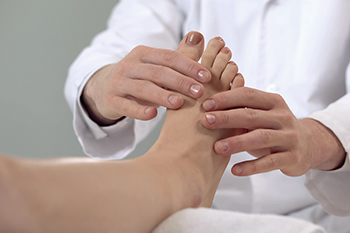
There are several reasons why swollen feet can occur. Many people who have sustained a foot injury can have swollen feet and this may be part of the healing process. When fluid is trapped in the body’s tissues it is known as edema. This can affect the feet and the skin may stretch or appear shiny. A limited range of motion in the ankles can also occur. Mild relief may come from frequently elevating the feet and reducing salt intake. Many pregnant women experience swollen feet, and this can be a result of the added weight the body endures due to the fetus and additional fluids. Swollen feet may be common among people who are overweight and lead a sedentary lifestyle. It is beneficial to implement a gentle exercise routine as well as wear shoes that fit well as this can help to alleviate swollen feet. If you have this condition, please confer with a podiatrist who can determine the cause of your swollen feet and provide remedies to help you.
Swollen feet can be a sign of an underlying condition. If you have any concerns, contact one of our podiatrists of Active Foot and Ankle Care, LLC. Our doctors can provide the care you need to keep you pain-free and on your feet.
Swollen feet are a common ailment among pregnant women and people who stand or sit for extended periods. Aging may increase the possibility of swollen feet and patients who are obese often notice when their feet are swelling too. There may be medical reasons why swollen feet occur:
Swollen feet can also be caused by bone and tendon conditions, including fractures, arthritis, and tendinitis. Additionally, there may be skin and toenail conditions and an infection may cause the feet to swell. Patients who take medicine to treat high blood pressure may be prone to getting swollen feet.
Many patients elevate their feet to help relieve the swelling and this is generally a temporary remedy. When a podiatrist is consulted the reason behind the swelling can be uncovered and subsequently treated.
If you have any questions please feel free to contact our offices located in Fair Lawn, Riverdale, and Englewood, NJ . We offer the newest diagnostic tools and technology to treat your foot and ankle needs.
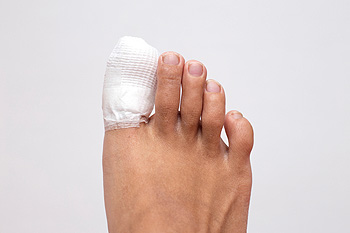
There are several small bones in the toes of each foot. When the toes are jammed into a piece of furniture or something heavy drops on them, they may fracture. The toes play a significant role in walking and maintaining balance, and a broken toe can affect your gait or walking style. Common symptoms include pain that will not subside, bruising, swelling, and redness of the affected area. In addition to having a physical examination, an X-ray is an effective method of determining a correct diagnosis. If the fracture is mild, buddy taping can be done. This is done by taping the affected toe to the toe next to it, as this provides stability for the healing process. In severe breaks, the bone may protrude from the skin and look deformed. This requires urgent medical attention, which may help to prevent infection, and surgery may be needed to properly align the displaced bone. If you feel you may have broken your toe, please confer with a podiatrist who can diagnose and treat this condition.
Broken toes may cause a lot of pain and should be treated as soon as possible. If you have any concerns about your feet, contact one of our podiatrists from Active Foot and Ankle Care, LLC. Our doctors will treat your foot and ankle needs.
What Is a Broken Toe?
A broken toe occurs when one or more of the toe bones of the foot are broken after an injury. Injuries such as stubbing your toe or dropping a heavy object on it may cause a toe fracture.
Symptoms of a Broken Toe
Although the injured toe should be monitored daily, it is especially important to have a podiatrist look at your toe if you have severe symptoms. Some of these symptoms include worsening or new pain that is not relieved with medication, sores, redness, or open wounds near the toe.
If you have any questions, please feel free to contact our offices located in Fair Lawn, Riverdale, and Englewood, NJ . We offer the newest diagnostic and treatment technologies for all your foot care needs.
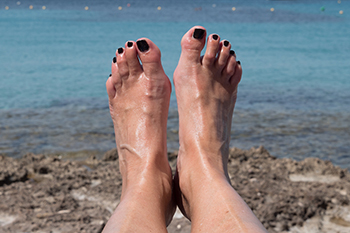
Certain afflictions of the foot that can hinder the health of your feet involve the nerves. Tarsal tunnel syndrome is one such condition. An individual can develop this affliction when the nerve that runs through the tarsal tunnel becomes compressed. The tarsal tunnel is found near the Achilles tendon, and the affected nerve is known as the tibial nerve. This nerve can become compressed in the tarsal tunnel for a variety of reasons. Most commonly, compression is due to an injury or stress over a prolonged period of time. Those who suffer from tarsal tunnel syndrome can experience a wide range of symptoms. For example, a patient might notice painful sensations that can reach well into the foot’s arch. Additionally, those with tarsal tunnel syndrome can experience a feeling of numbness, especially in the bottom of the feet, known as the soles. Swelling is also another common symptom of this foot condition. Pain caused by tarsal tunnel syndrome can sometimes make it more difficult to engage in physical activities such as walking and running. If you believe that you may have tarsal tunnel syndrome, contact a podiatrist for a diagnosis.
Tarsal tunnel syndrome can be very uncomfortable to live with. If you are experiencing tarsal tunnel syndrome, contact one of our podiatrists of Active Foot and Ankle Care, LLC. Our doctors can provide the care you need to keep you pain-free and on your feet.
Tarsal Tunnel Syndrome
Tarsal tunnel syndrome, which can also be called tibial nerve dysfunction, is an uncommon condition of misfiring peripheral nerves in the foot. The tibial nerve is the peripheral nerve in the leg responsible for sensation and movement of the foot and calf muscles. In tarsal tunnel syndrome, the tibial nerve is damaged, causing problems with movement and feeling in the foot of the affected leg.
Common Cause of Tarsal Tunnel Syndrome
The Effects of Tarsal Tunnel Syndrome
A physical exam of the leg can help identify the presence of tarsal tunnel syndrome. Medical tests, such as a nerve biopsy, are also used to diagnose the condition. Patients may receive physical therapy and prescriptive medication. In extreme cases, some may require surgery.
If you have any questions please feel free to contact our offices located in Fair Lawn, Riverdale, and Englewood, NJ . We offer the newest diagnostic and treatment technologies for all your foot and ankle needs.

Many individuals who take their health seriously make a special effort to look after the state of their feet on a daily basis. Having some sort of everyday foot care routine can be a very helpful way to maintain healthy feet and prevent complications from arising. There is certainly no shortage of recommended things to incorporate into your foot care routine. However, equally important are things to avoid doing every day that could negatively impact the health of your feet. First, you might avoid ignoring any pain or problems in your feet. Sometimes, you might feel tempted to dismiss any discomfort that could arise in your feet. However, it can be better to have a medical professional, such as a podiatrist, examine your feet when you notice anything abnormal. Second, you usually ought not to wear the same pair of shoes and socks day after day. When an individual fails to alternate their shoes and socks, it becomes very easy for bacteria, odors, and infections to take hold. Additionally, the sweat that accumulates when one fails to alternate shoes and socks can cause complications. These are just some of the many things that most people ought to avoid as part of their everyday foot care routine. For more information, please contact your podiatrist.
Everyday foot care is very important to prevent infection and other foot ailments. If you need your feet checked, contact one of our podiatrists from Active Foot and Ankle Care, LLC. Our doctors can provide the care you need to keep you pain-free and on your feet.
Everyday Foot Care
Often, people take care of their bodies, face and hair more so than they do for their feet. But the feet are a very important aspect of our bodies, and one that we should pay more attention to. Without our feet, we would not be able to perform most daily tasks.
It is best to check your feet regularly to make sure there are no new bruises or cuts that you may not have noticed before. For dry feet, moisturizer can easily be a remedy and can be applied as often as necessary to the affected areas. Wearing shoes that fit well can also help you maintain good foot health, as well as making it easier to walk and do daily activities without the stress or pain of ill-fitting shoes, high heels, or even flip flops. Wearing clean socks with closed shoes is important to ensure that sweat and bacteria do not accumulate within the shoe. Clean socks help to prevent Athlete’s foot, fungi problems, bad odors, and can absorb sweat.
If you have any questions please feel free to contact our offices located in Fair Lawn, Riverdale, and Englewood, NJ . We offer the newest diagnostic and treatment technologies for all your foot and ankle needs.
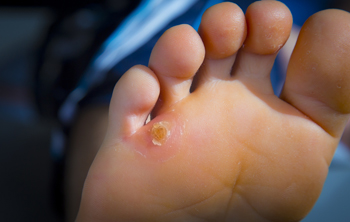
The health of your feet can be compromised by a condition known as corns of the feet. Corns are a type of callus that can develop on the feet, and they are usually composed of dead skin cells. Corns typically occur as a result of pressure and/or friction being applied to an area of the foot. There are several different kinds of corns that may develop on your feet. For example, you may have hard corns, soft corns, or seed corns. In some cases, the corns on your feet may be causing discomfort and pain. While seed corns are not typically painful, for instance, soft corns can cause pain. If you have a corn, it is important for you to be mindful of any pain you feel. If the corn becomes especially painful, or if it is red and leaking liquid of some sort, it is a good idea to seek out medical attention as soon as possible. Podiatrists specialize in maintaining the health of the feet and are particularly equipped to help you with your corns. Therefore, if you are experiencing a significant amount of pain in your feet due to a corn, it is suggested that you contact a podiatrist as soon as you can, who will help you identify and address the problem.
If you have any concerns regarding your feet and ankles, contact one of our podiatrists of Active Foot and Ankle Care, LLC. Our doctors will treat your foot and ankle needs.
Corns: What Are They? and How Do You Get Rid of Them?
Corns can be described as areas of the skin that have thickened to the point of becoming painful or irritating. They are often layers and layers of the skin that have become dry and rough, and are normally smaller than calluses.
Ways to Prevent Corns
There are many ways to get rid of painful corns such as wearing:
Treating Corns
Treatment of corns involves removing the dead skin that has built up in the specific area of the foot. Consult with Our doctors to determine the best treatment option for your case of corns.
If you have any questions please feel free to contact our offices located in Fair Lawn, Riverdale, and Englewood, NJ . We offer the newest diagnostic and treatment technologies for all your foot and ankle needs.
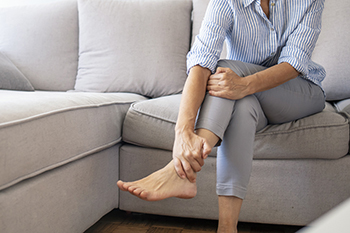
Many people have arthritis in various joints of the body, and this often includes the toes. It can happen as a result of cartilage that has been worn away causing the bones in the toes to rub together. This can produce severe pain and discomfort and generally happens to the big toe. There are various reasons why arthritis in the toes occurs including genetic history, being overweight, and increased age. Additionally, women who frequently wear high heels may be at risk to develop this type of arthritis, so it is suggested that flat shoes are alternated with high heels. The first symptom to accompany arthritis is pain. Patients often describe it as an ache that develops gradually, or it may feel like a stabbing sensation. Additional symptoms may include stiffness or swelling, and there can be a clicking noise. As arthritis develops, it may become difficult to walk and may feel better when the affected foot is elevated. If you have arthritis in your toes, it is strongly advised that you consult with a podiatrist who can guide you toward proper treatment techniques.
Arthritis can be a difficult condition to live with. If you are seeking treatment, contact one of our podiatrists from Active Foot and Ankle Care, LLC. Our doctors can provide the care you need to keep you pain-free and on your feet.
Arthritic Foot Care
Arthritis is a term that is commonly used to describe joint pain. The condition itself can occur to anyone of any age, race, or gender, and there are over 100 types of it. Nevertheless, arthritis is more commonly found in women compared to men, and it is also more prevalent in those who are overweight. The causes of arthritis vary depending on which type of arthritis you have. Osteoarthritis for example, is often caused by injury, while rheumatoid arthritis is caused by a misdirected immune system.
Symptoms
Arthritic symptoms range in severity, and they may come and go. Some symptoms stay the same for several years but could potentially get worse with time. Severe cases of arthritis can prevent its sufferers from performing daily activities and make walking difficult.
Risk Factors
If you suspect your arthritis is affecting your feet, it is crucial that you see a podiatrist immediately. Your doctor will be able to address your specific case and help you decide which treatment method is best for you.
If you have any questions, please feel free to contact our offices located in Fair Lawn, Riverdale, and Englewood, NJ . We offer the newest diagnostic and treatment technologies for all your foot care needs.

Going shoe shopping for runners can be incredibly difficult. With so many options to choose from, different brands, and different styles, selecting a running shoe can often feel daunting and impossible. However, there are certain guiding rules that you might consider keeping in mind when going shoe shopping. One guiding principle to bear in mind is that the type of running shoe that you select ought to be a good fit for the type of terrain that you are running on. For example, runners ought to consider whether they are primarily running on treadmills, tracks, streets/sidewalks, paths, or hills. Each type of terrain calls for different features in a running shoe. Namely, running on hard surfaces such as streets or sidewalks requires the running shoe to be heavily cushioned. You might look for a running shoe with hefty cushions and padding material around the heel. Running on tracks, however, requires the running shoe to have spikes so that you can grip the track and increase your speed. Lastly, if you are running on outside terrain such as a hill or an outdoor path, you could consider shopping for a running shoe that is weather resistant and significantly durable. If you are a runner in the market for a good pair of running shoes, contact a podiatrist who can help you in your search.
If you are a runner, wearing the right running shoe is essential. For more information, contact one of our podiatrists from Active Foot and Ankle Care, LLC. Our doctors can provide the care you need to keep you pain-free and on your feet.
Choosing the Right Running Shoe for Your Foot Type
To increase performance and avoid the risk of injury, it is important to choose the right running shoe based on your foot type. The general design of running shoes revolves around pronation, which is how the ankle rolls from outside to inside when the foot strikes the ground.
If you have any questions please feel free to contact our offices located in Fair Lawn, Riverdale, and Englewood, NJ . We offer the newest diagnostic and treatment technologies for all your foot and ankle needs.
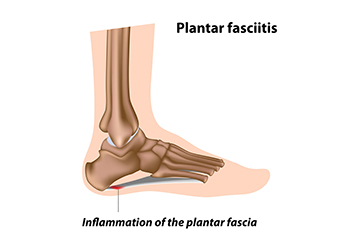
One of the most common sources of foot pain is a condition known as plantar fasciitis. This foot affliction usually results in heel pain and affects the plantar fascia, or the band of tissue that runs between the heel and the toes. Many people who suffer from plantar fasciitis will experience sharp heel pain. Runners are one group of individuals that are at risk of developing plantar fasciitis, which can make running significantly more difficult and painful. There are several steps that runners can take to essentially decrease their risk of developing plantar fasciitis from running. First, runners can be intentional about choosing what surfaces they run on. Specifically, runners can choose to run on soft, rather than hard surfaces to ultimately reduce the impact and pressure felt on their heels. Also, to reduce the strain felt on feet, runners can be careful not to increase the distance of their runs by anything more than 10 percent each week. If a runner wants to be particularly proactive, they may choose to also perform a gait analysis with a professional. The purpose of performing this kind of analysis is to try to detect any potentially problematic qualities of the runner’s stride before it leads to issues like plantar fasciitis. If you are a runner and want to learn more about how you can reduce your risk of developing plantar fasciitis, reach out to a podiatrist.
Plantar fasciitis is a common foot condition that is often caused by a strain injury. If you are experiencing heel pain or symptoms of plantar fasciitis, contact one of our podiatrists from Active Foot and Ankle Care, LLC. Our doctors can provide the care you need to keep you pain-free and on your feet.
What Is Plantar Fasciitis?
Plantar fasciitis is one of the most common causes of heel pain. The plantar fascia is a ligament that connects your heel to the front of your foot. When this ligament becomes inflamed, plantar fasciitis is the result. If you have plantar fasciitis you will have a stabbing pain that usually occurs with your first steps in the morning. As the day progresses and you walk around more, this pain will start to disappear, but it will return after long periods of standing or sitting.
What Causes Plantar Fasciitis?
There are some risk factors that may make you more likely to develop plantar fasciitis compared to others. The condition most commonly affects adults between the ages of 40 and 60. It also tends to affect people who are obese because the extra pounds result in extra stress being placed on the plantar fascia.
Prevention
There are a variety of treatment options available for plantar fasciitis along with the pain that accompanies it. Additionally, physical therapy is a very important component in the treatment process. It is important that you meet with your podiatrist to determine which treatment option is best for you.
If you have any questions, please feel free to contact our offices located in Fair Lawn, Riverdale, and Englewood, NJ . We offer the newest diagnostic and treatment technologies for all your foot care needs.
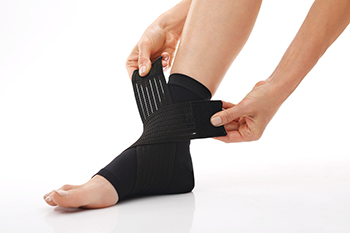
Ankle braces can help to support a weak ankle joint, as well as increase your mobility and protect the ankle from further injury. Anyone who has problems with plantar fasciitis, tendonitis, or previous ankle joint injuries may find it helpful to wear a brace. Experts believe it is best to wear an ankle brace after an injury, rather than beforehand, as a preventive measure. Constant use of an ankle brace can actually cause more harm than good, as it may prevent the surrounding muscles from gaining strength. Using a brace on occasion, say for a hike on uneven terrain or when playing a sport with a lot of lateral movement, is recommended. After an injury, a good ankle brace should provide support and stability during the healing process. In some cases, depending on the severity of the injury, a nylon boot may be recommended. As there are numerous types of ankle braces available, it’s a good idea to consult a podiatrist who can advise you on which one best suits your needs.
Ankle pain can be caused by a number of problems and may be potentially serious. If you have ankle pain, consult with one of our podiatrists from Active Foot and Ankle Care, LLC. Our doctors will assess your condition and provide you with quality foot and ankle treatment.
Ankle pain is any condition that causes pain in the ankle. Due to the fact that the ankle consists of tendons, muscles, bones, and ligaments, ankle pain can come from a number of different conditions.
Causes
The most common causes of ankle pain include:
Symptoms
Symptoms of ankle injury vary based upon the condition. Pain may include general pain and discomfort, swelling, aching, redness, bruising, burning or stabbing sensations, and/or loss of sensation.
Diagnosis
Due to the wide variety of potential causes of ankle pain, podiatrists will utilize a number of different methods to properly diagnose ankle pain. This can include asking for personal and family medical histories and of any recent injuries. Further diagnosis may include sensation tests, a physical examination, and potentially x-rays or other imaging tests.
Treatment
Just as the range of causes varies widely, so do treatments. Some more common treatments are rest, ice packs, keeping pressure off the foot, orthotics and braces, medication for inflammation and pain, and surgery.
If you have any questions, please feel free to contact our offices located in Fair Lawn, Riverdale, and Englewood, NJ . We offer the newest diagnostic and treatment technologies for all your foot care needs.






